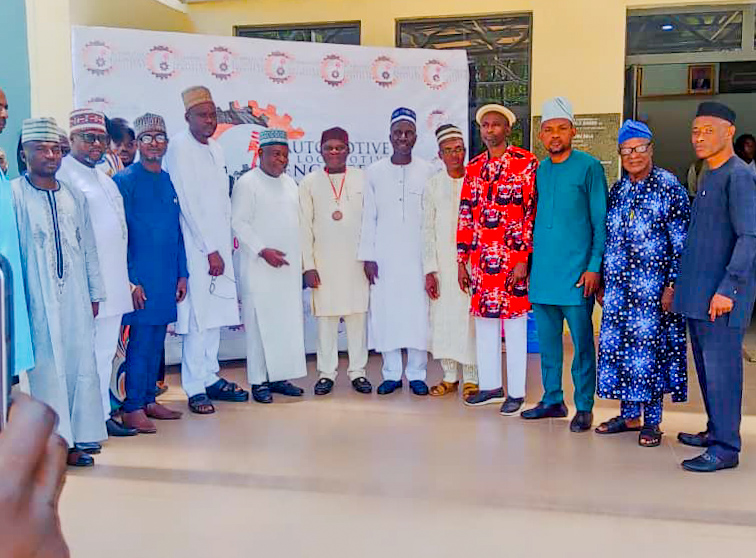By; ALEX UANGBAOJE, Kaduna Top government officials, industry leaders and engineering professionals converged on Ahmadu Bello University
By; ALEX UANGBAOJE, Kaduna
Top government officials, industry leaders and engineering professionals converged on Ahmadu Bello University (ABU), Zaria, for the 15th National Conference and Annual General Meeting (AGM) of the Automotive and Locomotive Engineers’ Institute (AutoEI), with a resounding call for innovation, sustainability and stronger industry-academic collaboration to drive Nigeria’s blue economy aspirations.
The conference, themed, “Automotive and Locomotive Engineering Innovations for a Sustainable Blue Economy,” brought together stakeholders from across the country between September 16 and 19, 2025, at the African Centre of Excellence on New Pedagogies in Engineering Education (ACENPEE).
Delivering a goodwill message, the Registrar and Chief Executive Officer of the National Business and Technical Examinations Board (NABTEB), Dr. Mohammed Aminu Mohammed, emphasized that Nigeria’s automotive and locomotive sectors would only thrive on a foundation of skilled technicians and craftsmen.
He proposed deeper collaboration between NABTEB and AutoEI in areas such as joint curriculum development, industry-driven skills assessment, innovation incubation and technology transfer, stressing that a robust pipeline of skilled manpower is indispensable for Nigeria’s technological and economic advancement.
Dr. Mohammed urged engineers to embrace clean transportation technologies, smart mobility, renewable energy integration and local manufacturing, adding that AutoEI must mentor the next generation while championing policies that protect and grow indigenous industries.
In her opening remarks, delivered by the Chairman of the NSE Kaduna Branch, Engr. Arege Samson Bawa, the President of the Nigerian Society of Engineers (NSE), Engr. Margaret Aina Oguntala, FNSE, commended AutoEI’s consistency and leadership over the past 15 years.
She described the conference theme as a call for action and innovation in a sector crucial to national development, urging participants to maximize knowledge exchange through technical sessions and panel discussions.
Oguntala also used the platform to spotlight NSE’s flagship International Engineering Conference and AGM scheduled for November 2025 at the University of Ibadan, which will gather over 6,000 engineers and policymakers under the theme “Engineering Innovation for a Sustainable Blue Economy.”
Welcoming delegates, the National Chairman of AutoEI, Engr. Sylvester A. Aye, PhD., FNSE, FAutoEI, acknowledged the impact of Nigeria’s tough economic realities but reaffirmed the Institute’s resolve to harness opportunities in the automotive and locomotive sectors for national growth.
He stressed that the industries remain engines of socio-economic transformation by driving job creation, industrial diversification and technological progress.
Highlighting AutoEI’s role in complementing government’s investments in railways and automobile assembly, Aye expressed confidence in the National Automotive Industry Development Policy (NAIDP) as a framework for industry growth.
He also announced the conferment of Fellowship award on Engr Ma’aruf Isyaku FNSE, Engr. Agee A. Abba MNSE and Engr. Prof. A. S. Samboan and a Honorary Fellowship of AutoEI on the Director-General of the National Automotive Design and Development Council (NADDC), Mr. Oluwemimo Joseph Osanipin, for his outstanding contributions to the sector.
Delivering the keynote address, Mr. Osanipin described the blue economy as a vital frontier for Nigeria’s growth, with automotive and locomotive systems at its core.
He painted a picture of a future where Nigerian ports are serviced by electric trucks, coastal cities run on CNG-powered buses, and zero-emission locomotives drive inland freight, creating jobs, boosting trade competitiveness and protecting the environment.
He outlined NADDC’s achievements under the relaunched NAIDP (2023–2033), which include 34 operational vehicle assembly plants across Nigeria, the establishment of end-of-life vehicle recycling regulations, support for local tyre, battery and component manufacturers, and the introduction of an Automotive Development Fund and vehicle finance scheme.
He also noted ongoing nationwide promotion of electric vehicles and compressed natural gas (CNG) programmes, the development of automotive supplier parks in Kaduna, Osogbo and Nnewi, the establishment of 21 automotive training centres equipped with modern tools, and the creation of a combined CNG workshop and EV solar charging hub to prepare Nigeria for the green transport transition.
Osanipin urged all stakeholders; government, industry, academia and engineers to work in synergy, stressing that the promise of the blue economy will remain unrealized if Nigeria’s vehicles and locomotives remain inefficient, polluting and outdated.
The conference featured technical paper presentations, policy dialogues and recognition of sectoral contributions, with stakeholders pledging continued collaboration to strengthen Nigeria’s automotive and locomotive industries as strategic enablers of the blue economy.
At the close of the opening ceremony, one message resonated clearly: innovation, sustainability and skills development are the fuel Nigeria must rely on to drive its automotive future and unlock the potentials of the blue economy.




COMMENTS